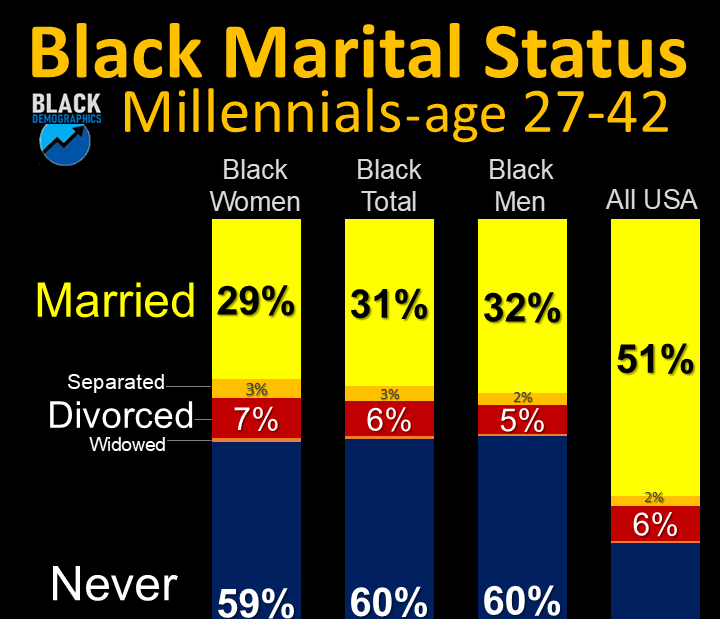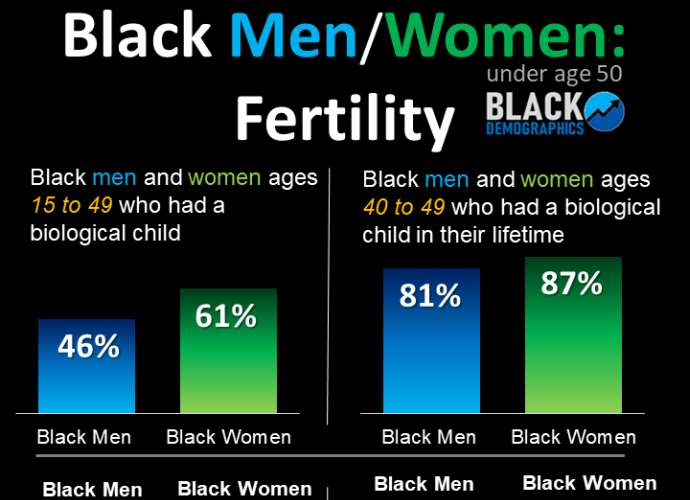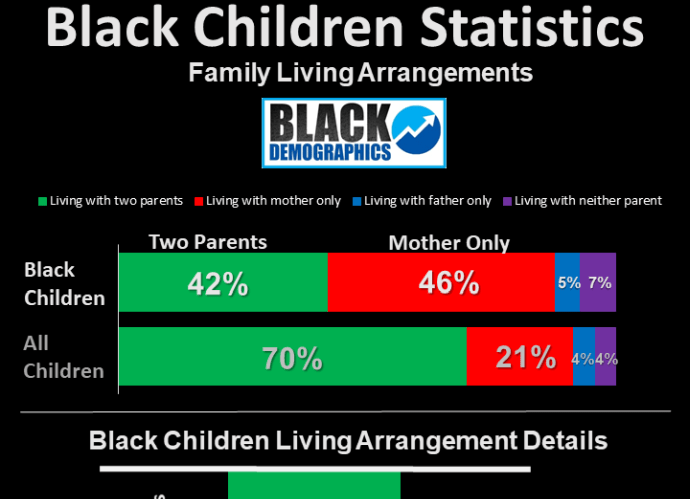Marriage in Black America: A Focus on Millennials
Black Millennials and Marriage
According to the latest data from the U.S. Census Bureau 2023 American Community Survey (ACS), 31% of Black Millennials are married. This is lower than the 48% marriage rate for all Americans and even with the overall marriage rate for all Black Americans (31%). Among Black Millennial men, 32% are married, compared to 29% of Black Millennial women. This gap aligns with broader gender patterns observed across generations but remains smaller than in older age groups. (Source)
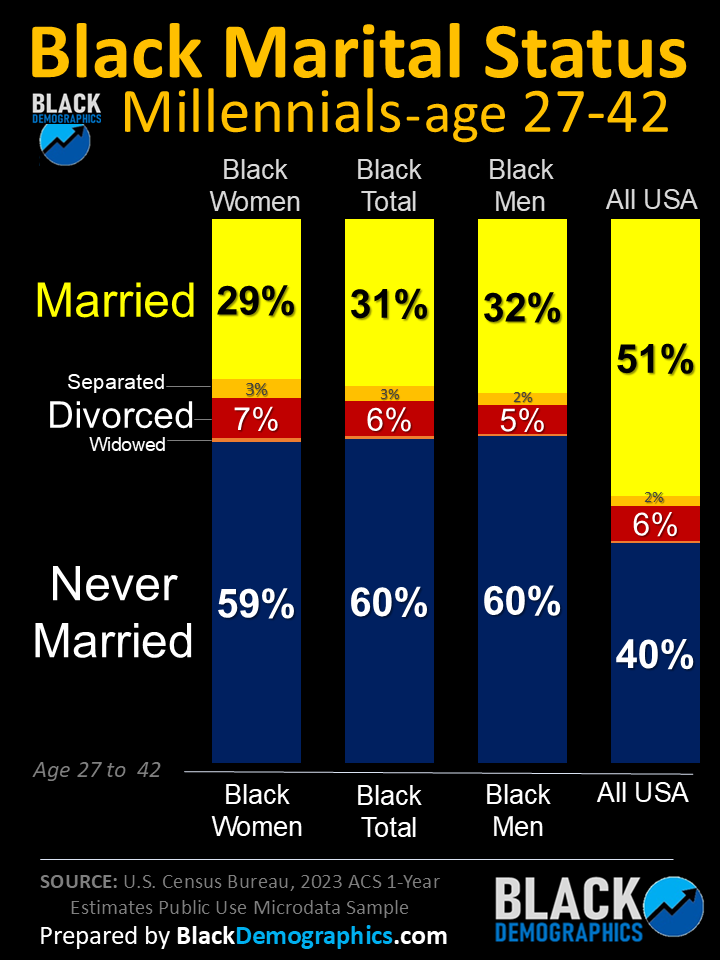
Divorce and Separation: Divorce rates among Black Millennials are lower compared to the total Black population. Only 6% of Black Millennials have been divorced, compared to 12% of the overall Black population. Similarly, separation rates are also lower, at 3% for Black Millennials, matching the rate for the overall Black population. (Source)
Never Married: A striking 60% of Black Millennials have never been married. This is a significant increase compared to 50% of the total Black population. The data highlights a clear generational shift toward delayed or forgone marriage, with Black Millennial women leading this trend at 59%, closely followed by Black men at 60%. (Source)
Marital Status and Economic Distribution
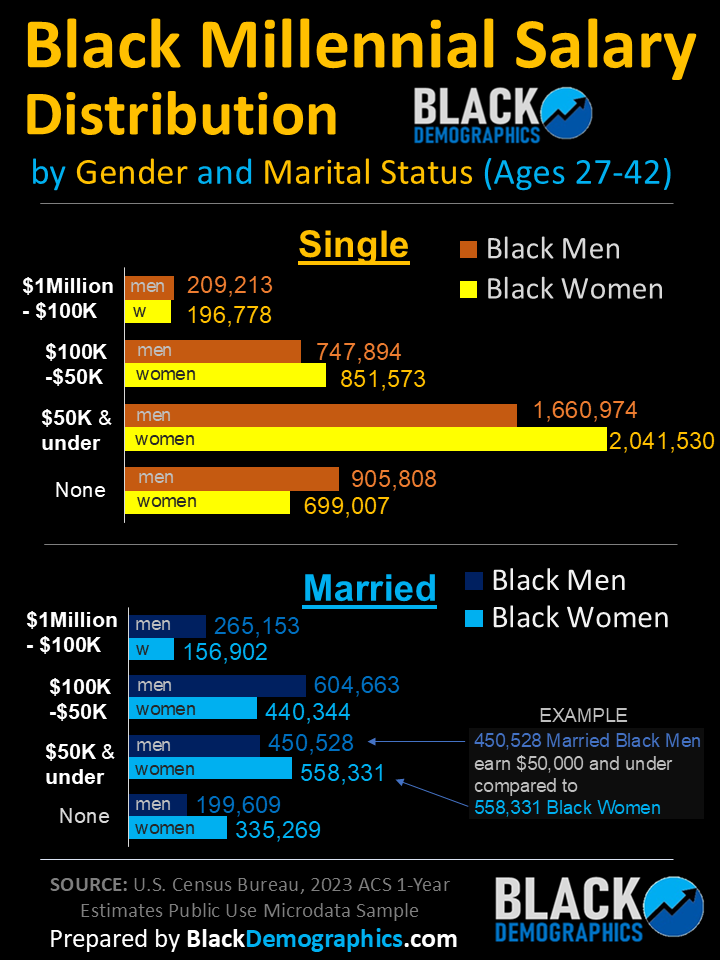
The salary distribution data for Black Millennials highlights the financial advantage of marriage, particularly within the context of two-income households. Married Black Millennials generally experience greater financial stability compared to their single counterparts. For instance, married Black men and women together bring in a more balanced distribution of income, which supports household economic resilience. While some married individuals may earn less independently than their single peers, the combined income of a married couple often exceeds that of single households. (Source)
By contrast, single Black Millennials, particularly women, are more likely to dominate the lower-income brackets, though many excel in mid-tier earnings ($100,000 to $50,000). Among single men, higher earners ($1 million to $100,000) slightly outpace single women, reflecting the broader economic challenges faced by single households compared to married couples. (Source)
These trends underscore the economic benefits of marriage, where shared financial responsibilities and combined incomes provide greater stability and opportunities for wealth-building. For many, this creates a pathway to achieving long-term financial goals, even if individual incomes may vary.
Comparisons Across Generations
When compared to the total Black population, Black Millennials show a lower likelihood of being married and a higher likelihood of having never been married. In contrast, older generations of Black Americans had higher marriage rates at similar ages. This trend reflects broader societal shifts, including changing attitudes toward marriage, economic pressures, and educational attainment. (Source)
In comparison to all U.S. Millennials, Black Millennials are less likely to be married (31% vs. 51%) and more likely to have never been married (60% vs. 40%). This discrepancy underscores the unique challenges and cultural factors influencing marriage within the Black community. (Source)
Gender Dynamics in Marriage Trends
The gender gap in marital status is evident but not as pronounced among Black Millennials as it is in the overall Black population. While 32% of Black Millennial men are married compared to 29% of Black Millennial women, the never-married rates for both groups are nearly identical (60% for men and 59% for women). These relatively balanced rates reflect a generational shift where men and women experience similar societal and economic factors influencing marriage. (Source)
Socioeconomic and Cultural Influences
The lower marriage rates and higher never-married rates among Black Millennials can be attributed to various factors:
- Economic Stability: Black Millennials face significant economic challenges, including higher unemployment rates and lower wealth accumulation compared to other racial groups. Financial insecurity often delays marriage. (Source)
- Educational Attainment: Increased focus on higher education among Black Millennials, particularly women, has contributed to delayed marriage as individuals prioritize career development. (Source)
- Cultural Shifts: Changing societal norms have led to greater acceptance of non-traditional family structures and cohabitation without marriage. (Source)
Conclusion
The marital status of Black Millennials reflects significant generational and societal changes. While marriage rates remain lower than the broader U.S. population, married Black Millennials demonstrate the financial advantages of two-income households, offering greater economic stability and resilience compared to their single peers. These trends emphasize the importance of addressing systemic challenges and supporting pathways to economic and relational stability within the Black community.
For a deeper dive into Black marriage trends across all age groups, visit Marriage in Black America.
BLACK MARRIAGE ARTICLES
Black Millennials and Marriage
Exploring Black Fertility and Family Trends
DATA CHART: Black Women More Likely to Marry than White Women Until…
DATA CHART: Black Children, Two-parent Households, and Black Fatherhood
RANK: Cities Where Black Men with Jobs Outnumber Black Women
Single Black GenX Women Outnumber Black Men by 600,000+
In 2021 Overwhelming Majority of Black Men and Women still had Black Spouses


